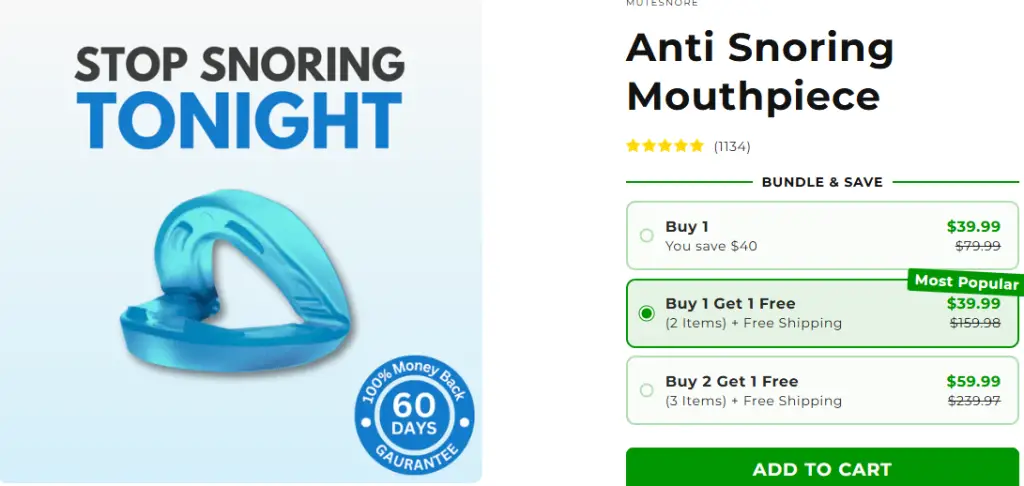MuteSnore is pitched as a simple, drug-free fix for snoring: pop in a tiny nasal device, open your airways, and sleep soundly without mouthguards or machines. Ads promise instant relief, partner-approved quiet, and a comfortable fit that “just works.” But is this a genuine solution or a fancy name on a basic nasal dilator with a premium price tag?
In this review, I’ll explain what MuteSnore is, how it claims to work, compare the promises to real-world results, highlight major red flags, answer does it really work, suggest better alternatives, and outline what to do if you already bought it or feel misled.
Key Takeaways
- Marketed as a nasal device that opens airways to reduce or eliminate snoring.
- Claims to improve sleep quality for both the user and their partner.
- Available mainly through the brand’s website and some online retailers.
- Customer feedback is very mixed, with concerns about comfort, durability, and effectiveness.
- No clinical proof that it works better than standard nasal dilators.

What Is MuteSnore?
MuteSnore is a nasal dilator device designed to reduce snoring by gently expanding the nasal airways. Unlike chin straps or mouthpieces, it fits directly into the nostrils and is supposed to improve airflow during sleep. The brand markets it as a simple, non-invasive, and drug-free solution that can also improve sleep quality for partners kept awake by snoring. It typically comes in different sizes for a custom fit, and it’s positioned as a more comfortable alternative to bulky anti-snore mouthguards. The product is usually sold online in single or multi-packs, with prices ranging from $20–$40 depending on the bundle.
How It Claims to Work
- Expands nasal passages to allow more airflow.
- Reduces airway collapse that can cause snoring vibrations.
- Claims to improve oxygen intake for better sleep quality.
Reality Check
- Works on the same principle as cheap nasal strips or dilators.
- No published clinical trials specific to MuteSnore.
- Not effective for people whose snoring comes from the throat or sleep apnea.
- Some users report initial discomfort and difficulty keeping it in overnight.
Red Flags to Consider
Limited Proof of Effectiveness
MuteSnore heavily markets its device as a solution to snoring, but it has no independent clinical studies. The idea of nasal dilation is not new, and cheap drugstore nasal strips often achieve the same effect for a fraction of the cost.
Comfort Issues
Many reviews mention discomfort inside the nostrils, with some users saying they couldn’t keep the device in for more than a couple of hours. Others reported soreness after nightly use.
Not Suitable for All Types of Snoring
The brand does not make it clear that snoring often originates from throat vibrations or sleep apnea. In those cases, MuteSnore won’t work, but the marketing makes it seem like a universal solution.
Questionable Value for Money
For $20–$40 per pack, MuteSnore is priced much higher than standard nasal dilators or strips, which cost less than $10. The lack of unique technology raises questions about whether the premium is justified.
Does It Really Work?
For some people with mild nasal congestion, MuteSnore may provide slight relief. However, it won’t work for everyone, especially if the snoring is throat-based or related to sleep apnea. Many users reported little to no improvement compared to cheaper alternatives.
Pricing
- Around $20–$40 depending on pack size.
- Subscription and bulk-buy options available on the official site.
- Cheaper alternatives (nasal strips or generic dilators) are widely available at $5–$10.
Alternatives
- Breathe Right Strips
- Rhinomed Turbine
- Zyppah
- CPAP machines
What To Do If Scammed
If you purchased MuteSnore and feel it was misrepresented:
- Request a refund directly from the seller or website.
- If purchased via credit card or PayPal, consider filing a chargeback.
- Report misleading claims to consumer protection agencies if the product was advertised as a “cure.”
Conclusion
MuteSnore is marketed as a breakthrough anti-snoring solution, but in reality, it’s just a nasal dilator with a fancy name and higher price tag. While some users might get mild relief, many report discomfort or no improvement at all. For most people, cheaper alternatives like nasal strips are more cost-effective. If snoring is persistent, especially if linked to sleep apnea, a medical consultation is the safest route.
Also Read – Euvelle Smart Glasses Review – Are They Worth the Hype? Read This Before You Buy!
